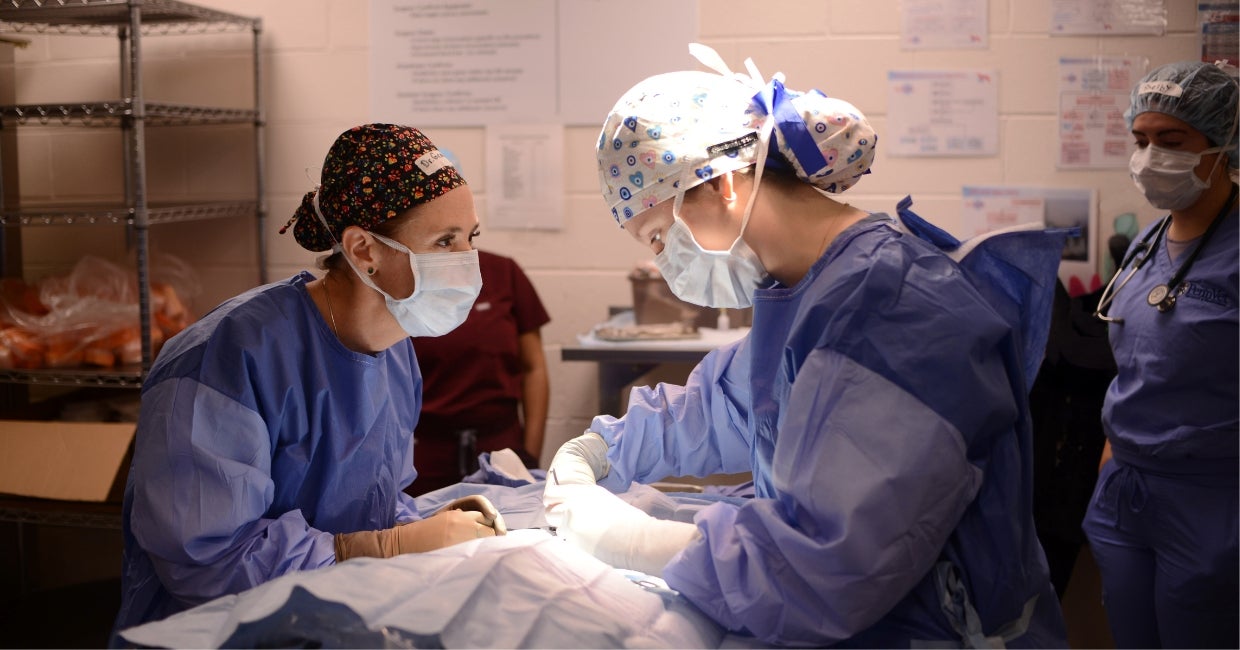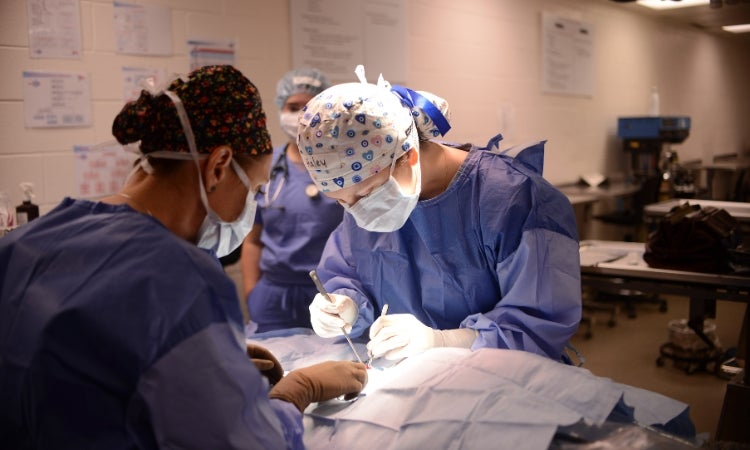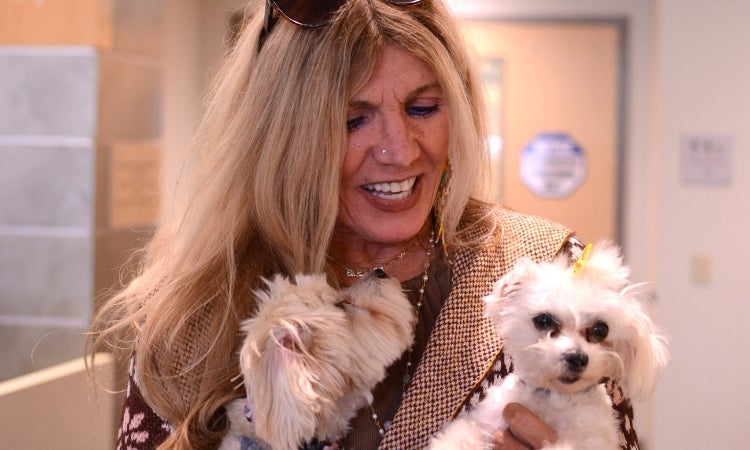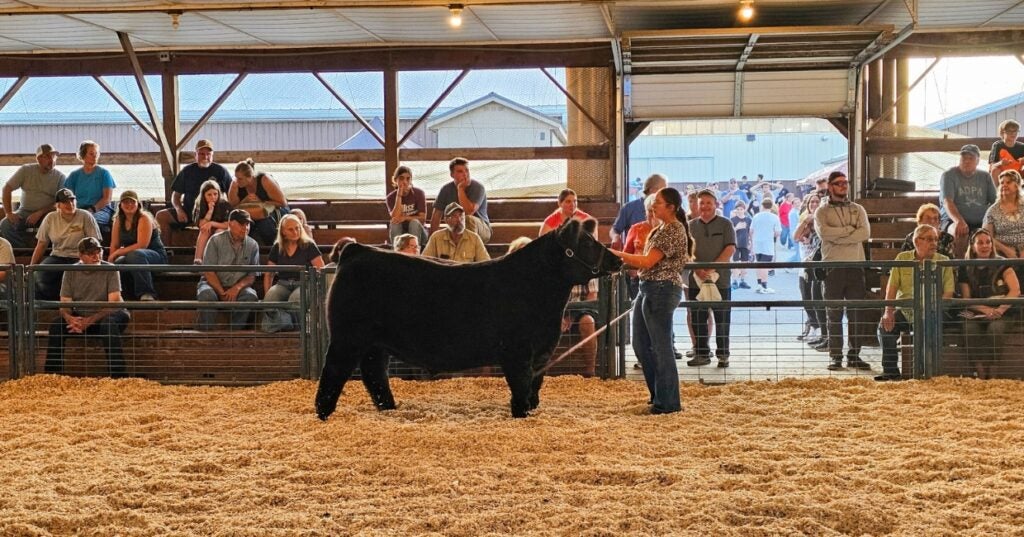Penn Vet’s Enhanced Approach to Teaching Primary Care Surgery Aims for Career-Ready Graduates

Brooklyn, a white Maltese dressed for warmth in a green frog hoodie, lay in anesthetized slumber under the bright lights of the Ryan Hospital’s junior surgery suite. On one side of the little dog was Julianne Grady, a veteran of primary care surgeries, and on the other was Haley Zeliff, V’26.
Brooklyn was at Ryan to get spayed. Zeliff was there to learn, but with the surgical instruments in her hands. Grady, her professor, was with her throughout the whole procedure, teaching, closely observing, and offering encouragement. Lots of encouragement.
“You’re good!” Grady told Zeliff after one point in the procedure.
“You want to unfold that,” Grady advised a bit later.
More instruction, demonstration, lots of seasoned advice. And finally, the end.
“All done! You did perfect,” Grady said.
In-hospital one-on-one spay-and-neuter surgery clinics on the primary care rotation organized by Grady and team represent a major adjustment to the way Penn Vet students learn how to perform a type of surgery that is one of the most basic yet essential in companion animal general practice. This 2025 addition to the primary care rotation is part of the new Penn Vet curriculum that was instituted in 2022 and will see its first graduating class in 2026.
“It’s a big departure from how we used to teach,” said Grady, V’96, a staff veterinarian who was hired specifically to teach primary care surgery in May 2024.
For as long as anyone can remember, spay and neuter surgical training in the core curriculum at Penn Vet was taught in larger group class settings. There would be multiple tables of students and dogs in the surgery area with a much smaller number of professors circulating through the room, instructing and answering questions. The students would have studied the procedure in their earlier veterinary school career, as they still do. But that one group surgery class would be the only time most of the students would participate in a spay or neuter procedure before they graduated from veterinary school, Grady said.
One-on-one instruction, plus more surgical experience
In the new curricular changes, every student learns to perform spay-neuter procedures during one-on-one surgical cases as part of the primary care rotation. During this rotation, students have the opportunity to participate in surgical clinics in multiple settings. In addition to the in-hospital surgery clinics organized by the primary care service, the primary care students get to take part in a long-standing weekly mobile unit feline spay-neuter clinic that has been facilitated by the Penn Vet Shelter Medicine and Community Engagement Program team and community partnering organization, Animal Care and Control Team of Philadelphia (ACCT Philly). All in all, they have the opportunity to perform procedures multiple times before graduation. Between the mobile unit clinics and primary care surgical clinics, the students now average just over five surgeries.
The goal is graduating students who leave Penn Vet career-ready, according to Mark Oyama, chair of the Department of Clinical Sciences and Advanced Medicine.
“The school is moving towards having students get more clinical experience before they graduate,” said Oyama, who is also Charlotte Newton Sheppard Endowed Chair of Medicine. “We want them to be as ready for day-one practice as possible, which means increasing the amount of exposure they have to surgeries on client-owned animals.”
In addition, Oyama said the intent is to add other procedures to the students’ learning experience.
“We want students to be exposed to a wide variety of different surgeries that they’re going to be asked to provide as primary care veterinarians,” he said.
Since many people adopt rescue animals that may already be spayed or neutered, Grady found through her own years in primary care practice that there is a large demand for other surgeries and procedures like mass removals, minor amputations, and treatments of lacerations. She wants to start teaching those in the primary care service.

A ‘win-win’ for students and nonprofit partners
Meanwhile, the emphasis on primary care has further fostered mutually beneficial relationships with some local animal nonprofit organizations. Grady and her team are hoping to develop primary care partnerships with more groups to provide surgical services to clients through non-profits organizations.
The Penn Vet Shelter Medicine and Community Engagement Program, which has a long history of partnering with community groups to provide animal care, is providing the primary care students surgical experience through its mobile clinic program in collaboration with ACCT Philly.
Canine patients are coming from Paws & Affection, a Narberth-based group that trains service and facility dogs for children, and Pets for Life, a Philadelphia group that supports people and their pets in under-served communities, also a partner of the Penn Vet Shelter Medicine Program.
Laura O’Kane, Paws & Affection’s executive director, said the arrangement has had multiple benefits.
“We’re taking our dogs somewhere we trust, that we know is fantastic, we’re helping future veterinarians be better veterinarians, and we’re saving money,” O’Kane said. “It’s a win-win.”
Pets for Life Philadelphia manager Melissa Corey said that many of her organization’s clients have struggled to seek veterinary care for their pets due to limited financial means or have never visited a veterinarian. The people who have brought their dogs for spay or neuter services with Grady’s Penn Vet primary care students have had a very different experience, she said.
“The fact that they get to come to the University of Pennsylvania, this renowned animal hospital, makes people feel special, and then Dr. Grady and her team literally come out to people’s cars when they pick up their animals and talk to them about their animals,” Corey said. “That’s huge in relationship building, especially with people who have never had conversations with a veterinarian before.”
The Penn Vet program provides the surgery at a reduced cost. That helps Pets for Life, a program of Humane World for Animals, offer it to their clients at no cost.
By the time Brooklyn, the Maltese who had undergone surgery that morning, was picked up by her owner, Angela DeVece, the pup had also received a primary care check-up, including her recommended annual vaccines, and had even had her nails trimmed.
DeVece had faith in her dog’s care going in.

“I’ll tell you,” the Philadelphia resident said, “I’ve interacted with Penn Dental and their students. They have these top doctors watching over them. So, I’m totally okay. And it’s much more affordable.”
The Penn Vet primary care students say they find one-on-one teaching a very positive way to learn surgery.
For Keara Lacon V’26, a recent spay surgery with Grady was her first time performing the procedure.
“I thought it was a great experience. It is very intimate,” Lacon said. “Dr. Grady was working with me, and you go from start to finish.”
That included being with the patient through recovery and calling the owner after the surgery. “You get to fully operate as if you are the doctor on the case,” she said.
Haley Zeliff, Brooklyn’s student surgeon, had experience with spay-neuter surgeries during externships and other extracurricular activities. But she said she still learned different techniques working with Grady.
Zeliff, who aspires to be a surgeon, believes that the primary care’s new one-on-one surgical experiences are a very effective way to teach procedures like these.
“It’s really nice to have that person next to you,” she said. “It really helps your confidence as a student. You have to be very sure of what you’re doing any time you’re doing surgery.”
Nonprofit animal organizations interested in more information about Penn Vet’s primary care surgery program can write to: vet-pcsurgery@vet.upenn.edu.
This story was updated on November 14, 2025
Related News

New Bolton Center Surgeons Come Through for Howee the Steer and his Girl
Mallie Touchton was always a farm animal kid. Since she was 8, Mallie was raising and showing her own market livestock – pigs, goats, and dairy calves. Even though she…

Wild birds are driving the current U.S. bird flu outbreak (link is external)
Since late 2021, a panzootic, or “a pandemic in animals,” of highly pathogenic bird flu variant H5N1 has devastated wild birds, agriculture, and mammals.
About Penn Vet
Ranked among the top ten veterinary schools worldwide, the University of Pennsylvania School of Veterinary Medicine (Penn Vet) is a global leader in veterinary education, research, and clinical care. Founded in 1884, Penn Vet is the first veterinary school developed in association with a medical school. The school is a proud member of the One Health initiative, linking human, animal, and environmental health.
Penn Vet serves a diverse population of animals at its two campuses, which include extensive diagnostic and research laboratories. Ryan Hospital in Philadelphia provides care for dogs, cats, and other domestic/companion animals, handling more than 30,000 patient visits a year. New Bolton Center, Penn Vet’s large-animal hospital on nearly 700 acres in rural Kennett Square, PA, cares for horses and livestock/farm animals. The hospital handles more than 6,300 patient visits a year, while our Field Services have gone out on more than 5,500 farm service calls, treating some 22,400 patients at local farms. In addition, New Bolton Center’s campus includes a swine center, working dairy, and poultry unit that provide valuable research for the agriculture industry.

